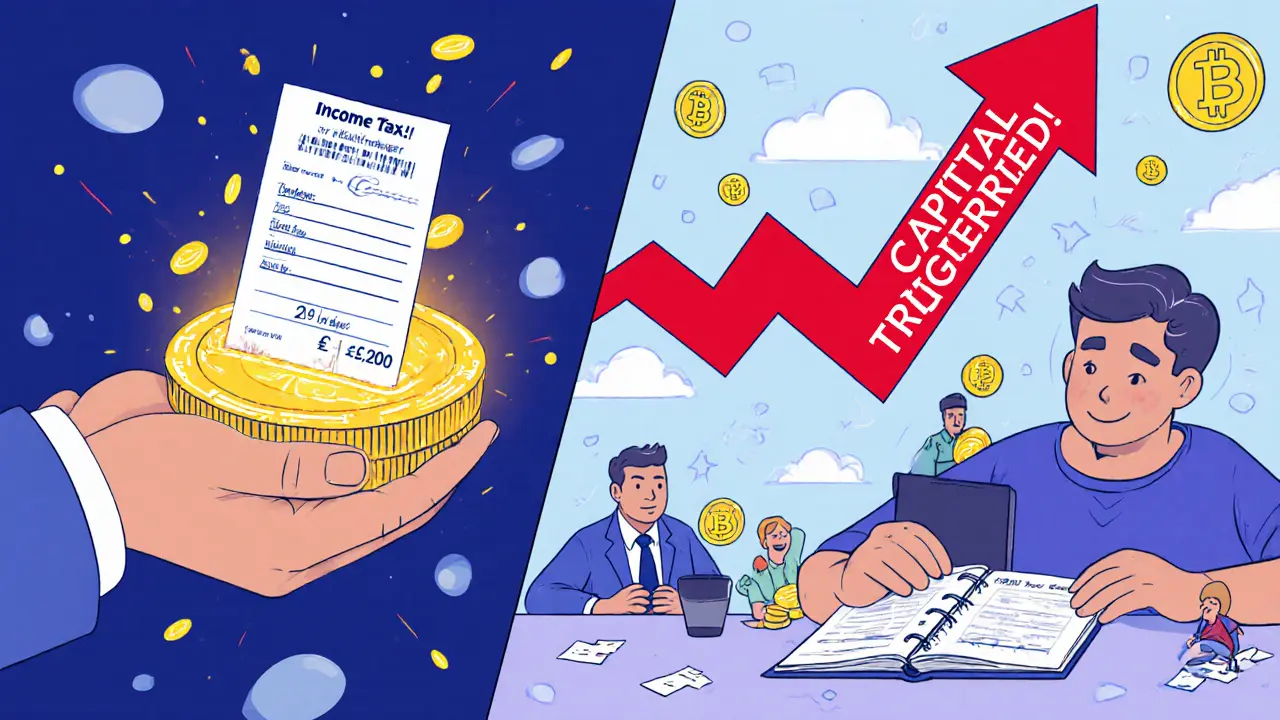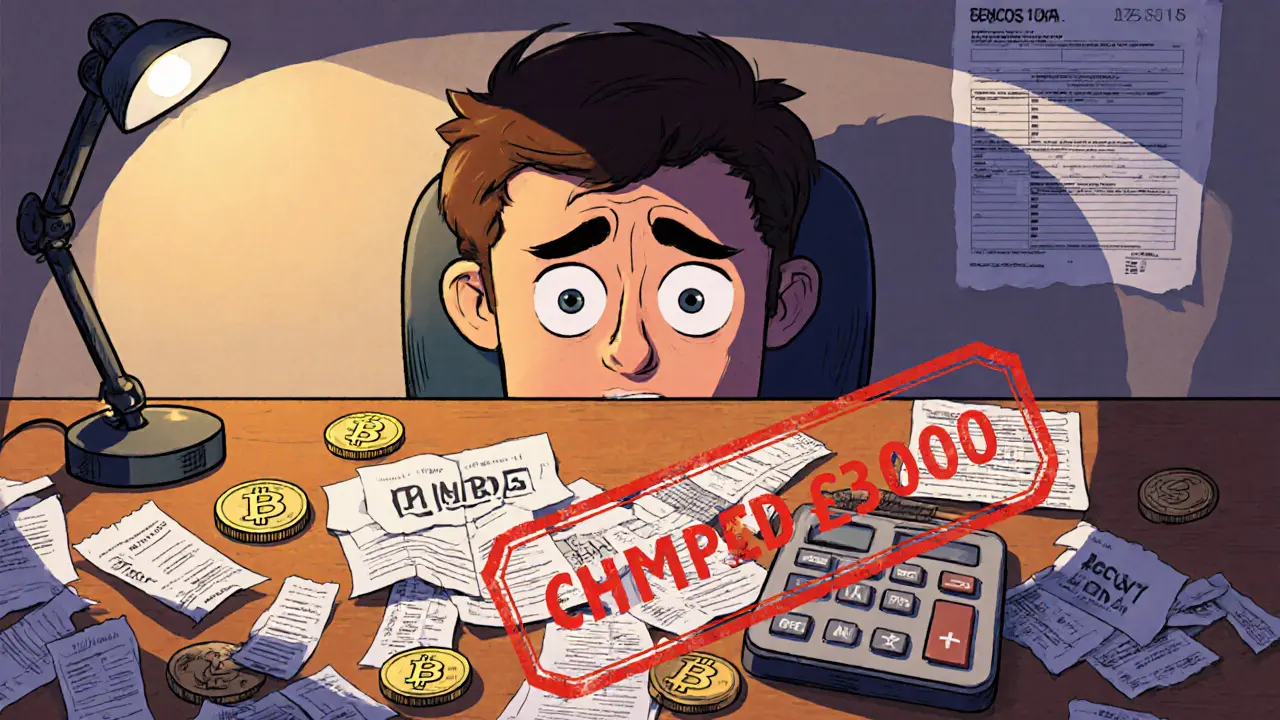Crypto Capital Gains Tax Calculator
Calculate Your Taxable Gain
Based on the 2025 UK rules with £3,000 annual allowance and new tax rates.
If you’ve bought, sold, traded, or earned cryptocurrency in the UK, you’re likely paying taxes on it - whether you realize it or not. The rules changed dramatically in October 2024, and what used to be a gray area is now a tightly enforced system. HMRC doesn’t treat crypto like cash. It treats it like stocks, property, or any other asset you might own. That means every trade, every gift, every staking reward could trigger a tax bill. And if you’re not tracking your transactions, you’re risking penalties.
What Counts as a Taxable Event?
- Selling crypto for pounds (GBP)
- Trading one crypto for another (e.g., BTC for ETH)
- Using crypto to buy goods or services
- Gifting crypto to anyone except your spouse or civil partner
- Receiving crypto as payment for work, mining, staking, or airdrops
That last one is where most people get caught off guard. If you earn £500 in ETH from staking, that’s not a free bonus - it’s taxable income. Same if you get an airdrop worth £200. Even if you don’t sell it, you owe income tax on its value when you received it.
And here’s the kicker: swapping Bitcoin for Ethereum is a disposal. HMRC doesn’t care that you didn’t cash out. You moved from one asset to another, and that triggers capital gains tax. Many investors think they’re just “swapping” - but HMRC sees it as selling one thing and buying another.
Capital Gains Tax: The £3,000 Rule
The big change in 2024? The annual capital gains tax (CGT) allowance dropped from £6,000 to £3,000. That’s the total profit you can make from selling crypto before you owe any tax. For most active traders, that’s gone in a few trades.
Let’s say you bought 0.5 BTC for £15,000 in January 2024. In March 2025, you sell 0.2 BTC for £10,000. Your gain? £4,000. That’s £1,000 over the £3,000 allowance. You owe CGT on that £1,000. If you’re a basic-rate taxpayer, that’s £180. If you’re higher-rate? £240.
And the rates changed too. Before October 2024, CGT was 10% or 20%. Now it’s 18% or 24%. The higher rate applies if your total taxable income - including crypto gains - exceeds £50,270. So even if you’re not rich, a big crypto gain could push you into the higher bracket.
Here’s the catch: you can’t just avoid tax by holding. If you’ve made £4,000 in gains across 12 trades, you don’t get to pick which ones to report. HMRC uses the “same-day rule” and “bed and breakfasting” rules to match your buys and sells. You can’t sell and rebuy the same crypto within 30 days to reset your cost basis. HMRC will still treat it as one continuous position.
Income Tax: Earning Crypto Is Like Getting Paid in Cash
When you mine Bitcoin, stake Ethereum, or get paid in crypto for freelance work, HMRC treats that as income. It’s not capital gains - it’s salary. You pay income tax on the pound value of the crypto at the time you received it.
For example: you stake 10 ETH and earn 0.3 ETH as rewards. On the day you receive it, 0.3 ETH is worth £800. That £800 goes on your income tax return. If your total income (including this) is £40,000, you pay 20% - £160. If you’re a higher-rate taxpayer, you pay 40% - £320.
Same with airdrops. If you get 500 tokens worth £1,200 because you held a certain coin, that £1,200 is taxable income. Even if you never sell those tokens, you still owe tax on the day you got them.
There’s a personal allowance of £12,570 for the 2024/2025 tax year. So if your only income is crypto earnings and you made £10,000 from staking, you pay nothing. But if you made £15,000, you pay tax on £2,430.

What You Must Track
HMRC doesn’t guess. They demand records. For every transaction, you need:
- Date of acquisition
- Amount of crypto bought
- Cost in GBP (including fees)
- Date of disposal
- Proceeds in GBP (after fees)
- Type of transaction (sale, trade, gift, etc.)
That’s not optional. If you’re audited and can’t prove your numbers, HMRC will estimate your gains - and they’ll assume the worst. They’ll use the highest possible value at the time of disposal to calculate your tax bill.
Most people use 3 or 4 exchanges. Some use DeFi protocols, wallets, or peer-to-peer trades. Each one is a separate data source. And if you’re trading frequently - say, 10 times a month - that’s 120 transactions a year. Multiply that by 5 different coins? You’re looking at 600+ data points.
That’s why 62% of UK crypto investors now use tax software like Koinly, CoinTracker, or Blockpit. Manual tracking? 87% of users say it’s overwhelming. One Reddit user spent 40 hours on his 2024/25 return. That’s a full workweek - for tax paperwork.
Losses: Your Only Escape Hatch
If you lost money on crypto, you can use those losses to reduce your capital gains tax. But only for capital gains - not income tax.
Example: You bought SOL for £2,000 and sold it for £800. That’s a £1,200 loss. You also made £5,000 in gains from selling ETH. You can offset £1,200 of that gain. Now you only pay CGT on £3,800. That’s £800 less in tax if you’re a higher-rate taxpayer.
And here’s the good part: you can carry losses forward forever. If you don’t have gains this year, save the loss for next year. But you can’t use crypto losses to reduce your salary tax. HMRC keeps those two buckets separate.

What’s Coming in 2026?
HMRC is rolling out mandatory reporting from all UK crypto exchanges starting January 2026. That means platforms like Binance, Coinbase, and Kraken will send your full transaction history directly to HMRC. No more hiding. No more “I forgot.”
It’s not just about big players. Even small DeFi platforms that operate in the UK must comply. This is similar to how banks report interest income. HMRC already has data from 47 exchanges as of early 2025 - up from just 12 in 2022.
There’s also talk of a £1,000 de minimis rule - where tiny transactions under £1,000 wouldn’t count. But that’s still unofficial. Don’t rely on it.
On the bright side, the FCA approved crypto exchange-traded notes (ETNs) in October 2025. That means you might soon be able to invest in crypto through a Stocks & Shares ISA - up to £20,000 per year, tax-free. But that’s a future option. For now, your crypto is still fully taxable.
Real Stories: What Happens When You Get It Wrong
One investor gifted £4,000 worth of ETH to his brother. He thought it was a personal gift - no tax. But HMRC saw it as a disposal. He owed £240 in CGT. He didn’t report it. HMRC caught it during a data match. He got a £1,000 penalty on top of the tax.
Another trader made £15,000 in gains from frequent trading. He thought the £6,000 allowance still applied. He filed his return with the old number. HMRC flagged it. He was hit with a 30% penalty for careless error. Total cost: £4,500 in tax and fines.
On the flip side, those who track everything? They’re optimizing. One trader on TradingView said: “I now time my sales to stay under £3,000. I sell £2,800 in December, wait a week, then sell the rest in January. It’s legal. And it saves me hundreds.”
What Should You Do Now?
- Download your transaction history from every exchange and wallet you’ve used since 2014.
- Use free crypto tax tools (like Koinly’s free tier) to calculate your gains and losses.
- Separate income (staking, airdrops, payments) from capital gains (sales, trades).
- File your Self-Assessment by January 31, 2026 - even if you owe £0.
- Keep records for at least 5 years. HMRC can go back that far.
Don’t wait for a letter. Don’t hope it’ll go away. HMRC is watching. And they’re not bluffing.
Do I pay tax on crypto I haven’t sold?
You only pay capital gains tax when you dispose of crypto - sell, trade, or spend it. But if you earned crypto through staking, mining, or as payment, you pay income tax on its value when you received it - even if you never sold it.
Is gifting crypto to a friend taxable?
Yes. Gifting crypto to anyone except your spouse or civil partner counts as a disposal. You owe capital gains tax on the profit you made on that crypto since you bought it. The recipient doesn’t pay tax until they sell it.
Can I use losses from one crypto to offset gains from another?
Yes. All crypto losses can be used to offset all crypto gains. You don’t need to match them by coin. A loss on Solana can reduce gains from Bitcoin. But you can’t use crypto losses to reduce your salary or business income tax.
What happens if I don’t report my crypto gains?
HMRC is now getting direct data from exchanges. If you don’t report, they’ll find out. Penalties range from 15% to 100% of the tax owed, depending on whether it was careless, deliberate, or hidden. In serious cases, you could face criminal charges.
Do I need to report crypto if I made less than £3,000 in gains?
You don’t owe tax if your total gains are under £3,000. But you still need to report them on your Self-Assessment if your total disposals exceed £50,000 - even if your profit is under the allowance. Always check the HMRC guidelines. Better safe than fined.
